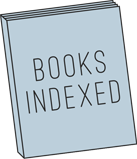information since 1996
—
Accurate, thorough indexes that are easy to use
—
Fast turnaround times and reasonable prices

I have indexed over 700 books in the past 25 years on subjects ranging from Yiddish Proletariat Theater to the Concise Polymeric Encyclopedia. Sample indexes are available on request.
Specialty Fields include:
- Sciences: Astronomy, Biology, Chemistry, Oceanography, Mathematics, Physics, Agriculture
- Medicine and Biochemistry
- Engineering and Technology
- Computers and Data Management
- Literature and the Arts
- Social Sciences
- Business and Finance
- Education, Development, and Psychology
- History and Political
- Sports and Exercise

Many people are unclear on the indexing process. I receive either printed or electronic pages from the editor or typesetter after the pagination is stable. I carefully read each page and pick up specific words or topic threads which extend through the book. I enter these into my Cindex indexing software, which then formats each entry according to my specifications. After I have read through the entire book, entering headings and subheadings, I then read through the index as written, editing and completing it. This involves revisiting the text as needed. When I am satisfied that the index contains all the information from the book in a thorough, yet simple, format, I proofread the index and convert the file from Cindex to .RTF format. I check through the final copy of the index for last minute content and format changes.

Rates for indexing vary with each project. Prices usually range from $4 to $6 per indexable page. The price varies primarily with the density of information on a page. Middle school textbooks and self-help books contain very few entries per page tend to be charged at the lower end of range. Conversely, complex technical books are charged at the middle to upper end of the range. I am also sensitive to budgetary constraints for individual projects.
Factors which affect index prices:
- Density of information on the text pages
- Complexity of the indexing format
- Budgetary constraints for individual projects


The two most common index formats are indented and run-in. I have posted sample indexes in both indented and run-in formats.
Indented indexes look simpler and are easier to useas defining part of theater, 6
director as stand-in for, 132
etiquette by, 199-201
influence on actors, 110-111
at previews, 132
Run-in indexes yield the same amount of information in fewer pages, although the information requires a closer reading
stand-in for, 132; etiquette by, 199-201;
influence on actors, 110-111; at previews, 132

The following specifications include some of the client choices concerning the index appearance. Publishing companies often have indexing specification sheets. Other clients merely enclose a page from an index whose format they like. This list will also help clarify the vocabulary of indexing.
Alphabetizing rules for headings:
Letter-by-letter. This routine sorts entries by the order of letters in the heading, regardless of word divisions. Dictionaries and most book indexes use this sort routine. An example of letter-by-letter sort: big dogs, bigger trucks, big horses
Word-by-word. This routine sorts entries alphabetically but stops after the first word, using the second word only if two headings begin with the same first word. Telephone books as well as title and other specialty indexes use this sort routine. An example of word-by-word sort: big dogs, big horses, bigger trucks
Cross-reference Location:
See and See also cross-references can be placed either directly after the main heading or at the end of the subheadings.
Number Abbreviation:
Page references can be listed with the full number, as in 271-278, or abbreviated to conserve space in one of two ways, either the Chicago abbreviation (e.g., 271-78) or the Hart abbreviation (e.g., 271-8).
Capitalization:
The initial letter of the main headings can be capitalized or lower-case.
Bold and Italic Page Locators:
Occasionally, editors wish to call out figures, illustrations, tables, photographs, or other special material by use of either bold or italic page locators. Certain headings, such as artist names or words defined in the glossary, may also be listed in bold or italic type.

Education
Certificate in Indexing from U.S. Department of Agriculture, 1996
Ph.D. in Soil Chemistry, University of California at Riverside, 1981
B.S. in Soil Science, California Polytechnic State University, 1975
B.A. in History, University of California at Santa Barbara, 1972
Experience
| 1996 to present | Principal, Nota Bene Indexing |
| 1988 to 1996 | Senior Chemist, Landau Associates, Inc., Edmonds, Washington |
| 1986 to 1988 | Environmental Scientist, California Public Health Foundation, Berkeley, California |
| 1985 | Project Scientist, Woodward-Clyde Consultants, Walnut Creek, California |
| 1984 to 1985 | Environmental Consultant to Memorex Corporation, Santa Clara, California |
| 1983 to 1984 | Postdoctoral Research Affiliate, Institute for Inorganic, Organic, and Physical Chemistry, University of Berne, Berne, Switzerland |
| 1981 to 1983 | Postdoctoral Research Student, Civil Engineering Department, Stanford University, Stanford, California |

